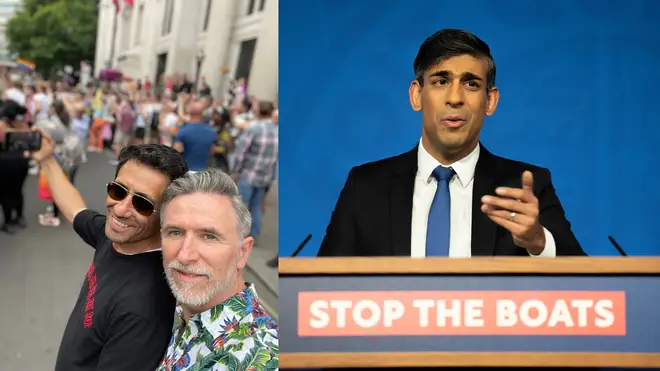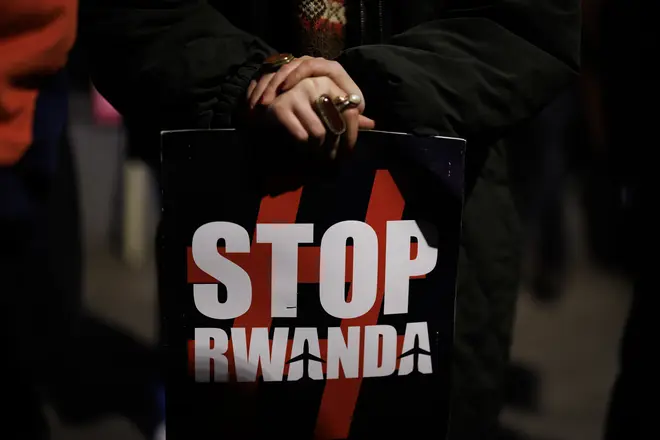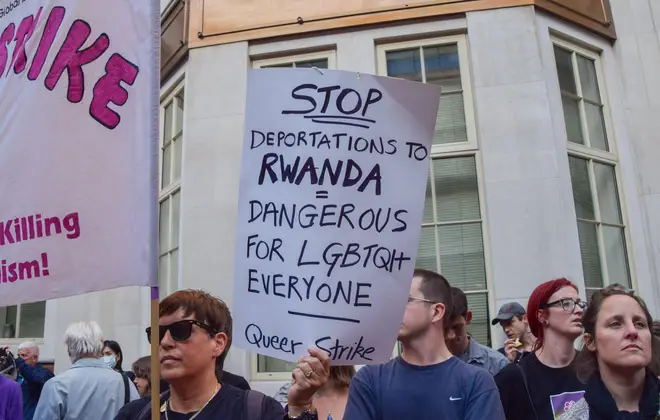
Matthew Wright 7am - 10am
28 March 2024, 08:25 | Updated: 28 March 2024, 10:15

The first gay couple to marry in the UK has expressed "outrage" at the Rwanda Bill, as LBC reveals a lesbian woman from Rwanda feared the Home Office would "make an example of her".
Peter McGraith and his husband David Cabreza made history tying the knot ten years ago on March 29, 2014, the first day same-sex marriage became legal.
Marking the milestone, Peter said he is disappointed the government is not doing more to protect non-British LGBTQ+ people, particularly asylum seekers.
LBC can reveal a gay woman from Rwanda – granted asylum in the UK – feared she would be used as ‘an example’ by the Home Office and sent back home.

With same-sex marriage legalised 10 years ago, caller claims the govt is 'ludicrously far behind'


Its founder Aderonke Apata, a barrister who is herself a lesbian asylum seeker from Nigeria, told LBC her organisation is supporting up to 900 asylum seekers, many of whom have arrived in Britain after crossing the channel.
Ms Apata said: "She [the Rwandan woman] told us how she was being discriminated against by the people in the community and how fearful that she was to live as a lesbian there.
"Even when she was going for her interview, she texted me and said I'm scared that the government might want to use me as an example and refused me so that they can send me back home.
"As luck would have it, she had an interview, we wrote her support letter and she had proof as much as she could produce to the Home Office, and she was granted asylum as a lesbian.
"You can imagine the trauma that she was going through, even the trauma that I was going through when she was going for the interview."
The Home Office has been approached for comment.
Ms Apata said LGBTQ+ migrants face extremely challenging circumstances when applying for asylum, because many are not open about their sexuality, or because of their upbringing do not know how to express it properly.
The barrister told LBC: "There are so many things that would make somebody's credibility to be called into question. One, it could be because they don't know how to articulate their experience, and for some people who have interpreters, interpreters may not be interpreting well or they might not even understand their own language.
"Sometimes people are even scared to talk to the interpreters because they're not sure if they're going to ask them to bring evidence. It's a grey area. How do you prove your sexuality? Do you want me to go and make a video of myself to show to you? Well, I was a victim of that when I was seeking asylum myself, that was how desperately I wanted to prove to the government that this is who I am."
A Home Office spokesperson said: “Rwanda’s constitution includes a broad prohibition on discrimination and does not criminalise or discriminate against sexual orientation in law, policy or practice.
“Everyone considered for relocation will be screened and have access to legal advice. Caseworkers thoroughly assess the credibility of each claim on their individual merit and no relocations will be made if individuals are at risk.”